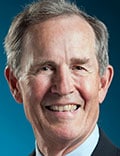In 2013, a landmark study concluded that the cost of treating dementia in the United States was similar to that of treating cancer and heart disease — and posed “a substantial financial burden on society.”
Fast forward 9 years, where another study published this past November found that declining rates of dementia in the elderly could ease that burden, which could exceed $500 billion annually by the time the last of the Baby Boomers reaches age 65.

Dr Michael Hurd
Michael D. Hurd, PhD, director of the RAND Center for the Study of Aging, was a co-author of both articles. Each drew from the Health and Retirement Study (HRS), which for more than three decades has been among the nation’s leading sources of new information about the health, wealth, and happiness of Americans over 50.
He recalled that his 2013 paper triggered an earthquake in healthcare when it appeared in the New England Journal of Medicine. The findings — which landed on the front page of The New York Times — represented the first major research on the looming crisis that did not come from an advocacy group like the Alzheimer’s Association.
“People would go to Congress and say, ‘My aunt Betsy is suffering from dementia, and it’s terrible.’ And the Congressmen said, ‘Yes, it’s terrible,’ ” Hurd, an economist, said. “After this [2013] article, it became clear that dementia would be costly. That got the attention of Congress.”
A Lot of Old People
Since then, the annual budget for the National Institute on Aging, which funds most of HRS’ work, has quadrupled, reaching $4.1 billion in 2022.
“The funding for our study has never really faltered over 30 years,” said Amanda Sonnega, PhD, associate research scientist and spokeswoman for HRS, which is based at the University of Michigan in Ann Arbor. “Everywhere you go there’s just going to be a lot of old people. They are highly visible. The lawmakers themselves are aging into it.”
In 2020, according to the Census Bureau, 17% of Americans were 65 or older, a 34% rise since 2010. By 2030, the last of the Baby Boomers will turn 65, and 1 in 5 Americans will be of retirement age. The average age of members in the 117th Congress, which ended earlier this month, was 58.4 years for Representatives and 64.3 years for Senators.

Dr Amanda Sonnega
The HRS was created by an act of Congress in 1992, in anticipation of the swelling demographic. HRS has since examined every aspect of the lives of people aged 50 and older, with researchers interviewing 20,000 participants every 2 years and asking the same questions to get a handle on life changes. They recently have begun to study Generation X, Americans born from the mid- to late-1960s to roughly 1980.
“Almost all of the work I do uses the HRS,” said Hurd, who helped design the original system. RAND, a nonprofit research organization, has devised a user-friendly version of HRS research and develops its own models.
The work on dementia exemplifies the mixture of 300 peer-reviewed studies per year that emerge from HRS.
Are older people better off now than when the study began? “In some ways, yes, and in some ways no,” Sonnega said.
“We do continue to live longer. Average life expectancy does continue creeping up,” she said, despite some recent dips attributable to COVID-19 and the opioid crisis. “What we see, though, is that this Baby Boom generation does not really seem to be in as good health as other generations, particularly in terms of physical functioning.”
Among the questions HRS participants are asked revolve around everyday activities, such as whether they can stoop, lift objects, or walk a quarter-mile.
Research has shown that older Americans, who are likelier to be more obese than their predecessors and less likely to move, report being in more pain. “Not moving your body is terrible for pain,” Sonnega said.
The glut of opioids prescribed by doctors hasn’t alleviated that problem.
“You’d think we’d see in the data reports of less pain, but we don’t,” Sonnega said. “Your body habituates to whatever the opioid does, and it doesn’t manage your pain anymore.” In states that have legalized marijuana, seniors reported less pain “because they are getting pain relief.”
Studies using data from the HRS have found that volunteering, connecting via social media, and having a partner — even a dog that forces people to step out a few times a day — are helpful to health outcomes during aging.
“Tsunami” of Dementia on the Horizon
The most recent research on dementia, which appeared in the Proceedings of the National Academy of Sciences, found that the incidence among people aged 65 and older fell nearly a third, to 8.5%, between 2000 and 2016. The drop was especially sharp among Black men.
“We speculated that it may be due to education,” Hurd said. “It’s become easier for people to go to college,” after which “you have access to 40 years of occupation that may use your brain more.”
Hurd adds that older Americans are experiencing fewer cardiovascular causes of dementia, but he warned that Alzheimer’s disease is the biggest driver of the condition. “We don’t know what causes that, or any way of preventing it or slowing its onset,” he said.
Although rates of dementia are creeping downward, Sonnega said that because of “this explosion in the number of people who are old, we still have a tsunami coming.”
John Dillon is a journalist in Boston.
For more news, follow Medscape on Facebook, Twitter, Instagram, YouTube, and LinkedIn
Source: Read Full Article





